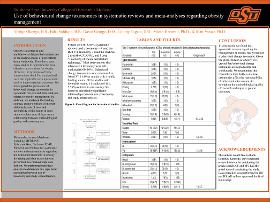| dc.contributor.author | Okonya, Ochije | |
| dc.contributor.author | Siddiqui, Bilal | |
| dc.contributor.author | George, David | |
| dc.contributor.author | Fugate, Colony | |
| dc.contributor.author | Hartwell, Micah | |
| dc.contributor.author | Vassar, Matt | |
| dc.date.accessioned | 2023-11-02T20:47:14Z | |
| dc.date.available | 2023-11-02T20:47:14Z | |
| dc.date.issued | 2023-02-17 | |
| dc.identifier | ouhd_Okonya_useofbehaviouralchangetaxonomies_2023 | |
| dc.identifier.citation | Okonya, O., Siddiqui, B., George, D., Fugate, C., Hartwell, M., and Vassar, M. (2023, February 17). Use of behavioural change taxonomies in systematic reviews and meta-analyses regarding obesity management. Poster presented at Research Week, Oklahoma State University Center for Health Sciences, Tulsa, Ok. | |
| dc.identifier.uri | https://hdl.handle.net/11244/339936 | |
| dc.description.abstract | Aims: We investigated the prevalence of behavioral change taxonomies in systematic reviews and meta-analyses related to obesity management. In addition, we analyzed the funding sources, author conflicts of interest statements, risk of bias, and favorability of the results in such studies to determine if there was a relationship between methodological quality and taxonomy use. | |
| dc.description.abstract | Methods: We searched several databases including MEDLINE, Epistemonikos, Cochrane EDSR, Pubmed, and Embase for systematic reviews and meta-analyses regarding the behavioral treatment of obesity. Screening and data extraction was performed in a masked, duplicate fashion. We performed statistical analyses to determine any significant association between use of taxonomy and study characteristics. | |
| dc.description.abstract | Results: Fifteen (of 186; 8.06%) systematic reviews used a taxonomy—9 used the BCTTv1, 3 used OXFAB, 2 used the CALO-RE, and 1 used “Taxonomy of choice architecture techniques.” Most interventions that referenced a taxonomy were self-mediated (6/60, 10%). Behavioral change taxonomies were mentioned in 10 (of 87, 11.49%) studies with a public funding source. Of the studies with favorable results, 14 studies (of 181, 7.73%) referred to a taxonomy. We found no statistically significant relationships between use of taxonomy and study characteristics. | |
| dc.description.abstract | Conclusions: We found that systematic reviews regarding the management of obesity rarely mention a behavioral change taxonomy. Given the global burden of obesity, it is crucial that behavioral change techniques are reproducible and translatable. We recommend that researchers look further into how taxonomies affect the quality and reproducibility of behavioral interventions in an effort to improve patient outcomes. | |
| dc.format | application/pdf | |
| dc.language | en_US | |
| dc.publisher | Oklahoma State University Center for Health Sciences | |
| dc.rights | The author(s) retain the copyright or have the right to deposit the item giving the Oklahoma State University Library a limited, non-exclusive right to share this material in its institutional repository. Contact Digital Resources and Discovery Services at lib-dls@okstate.edu or 405-744-9161 for the permission policy on the use, reproduction or distribution of this material. | |
| dc.title | Use of behavioural change taxonomies in systematic reviews and meta-analyses regarding obesity management | |
| osu.filename | ouhd_Okonya_useofbehaviouralchangetaxonomies_2023.pdf | |
| dc.type.genre | Presentation | |
| dc.type.material | Text | |
| dc.subject.keywords | obesity | |
| dc.subject.keywords | behavioral change | |
| dc.subject.keywords | taxonomy | |
| dc.subject.keywords | systematic review | |
| dc.subject.keywords | weight loss | |
